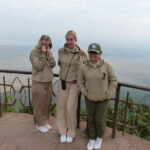Tipping Etiquette in Tanzania for Travelers with Rolux Safaris & Trekking
Tipping is an important aspect of travel etiquette in Tanzania, especially when you embark on a safari or trekking adventure with Rolux Safaris & Trekking. While it isn’t mandatory, it shows appreciation for the good service you receive. Guides, cooks, and porters often rely on tips as part of their income. Knowing who to tip and how much can make your experience smoother. Plus, it contributes to the local economy, helping the community.
On a safari, your guide plays a crucial role in ensuring you have a memorable experience. Thus, it’s common to tip your guide around $10 to $20 per day. For the cook, a tip of $5 to $10 per day is appreciated. Porters, who assist with carrying luggage, usually receive $2 to $5 per day. These amounts can vary based on the level of service.
In lodges and hotels, tipping the service staff is also appreciated. Housekeepers and waitstaff typically receive small tips. A dollar or two for good service can go a long way. Additionally, if you have a driver, a tip of $10 to $15 per day is appropriate. Knowing these amounts helps you budget for your trip.
Tipping not only promotes good service but also fosters a positive relationship between tourists and locals. When you tip, you’re acknowledging the hard work and dedication of the service providers. It creates a sense of respect and encourages excellence. By following these guidelines, you ensure your trip with Rolux Safaris & Trekking is enjoyable for both you and the staff.
Understanding Whom to Tip on Your Safari or Trek
When going on a safari or trek with Rolux Safaris & Trekking, it’s important to know who to tip. Your guide is one of the most important people to tip. They ensure you see incredible wildlife and have a safe journey. Without their expertise, your experience wouldn’t be the same. A tip shows your appreciation for their hard work.
Another group to consider tipping is the porters. They carry your heavy bags and set up your camps. Their work behind the scenes is crucial to your comfort. A small tip can mean a lot to them. The porters often rely on these tips as part of their income.
Cooks also play a vital role on your trip. They prepare the meals that keep you energized for the trek. A good cook can make a big difference in your overall experience. Tipping the cook shows gratitude for their delicious meals and hard work. It encourages them to continue providing great service.
Don’t forget the hotel staff, such as housekeepers and waiters. While you may not interact with them as much, their service is still important. A small tip for good service is always appreciated. By tipping these individuals, you support the local economy and ensure a positive experience for everyone involved.
Guidelines on How Much to Tip Service Providers
If you’re wondering how much to tip on your Tanzania adventure, here’s some guidance. For your safari guide, consider tipping around $10 to $20 per day. This amount acknowledges their expertise and effort. Cooks, who prepare your meals, can be tipped about $5 to $10 daily. This shows appreciation for their hard work behind the scenes.
Porters, who carry your heavy gear, usually receive $2 to $5 per day. They put in a lot of physical effort, and this tip helps support their livelihood. Hotel and lodge staff, such as housekeepers and waiters, can be tipped $1 to $2 per service. Though these amounts may seem small, they add up and are much appreciated by the staff.
Drivers also play a crucial role in your trip. A driver who ensures your safety and comfort can be tipped around $10 to $15 per day. This is for someone who drives you on long journeys or multiple days. Remember, tipping is a personal choice, but these guidelines can help you plan your budget.
To make it easier, you can carry small bills in both Tanzanian Shillings and US Dollars. This allows you to tip conveniently without needing change. Be ready with the appropriate amounts and distribute tips directly to the individuals. Following these guidelines shows respect and helps maintain excellent service.
The Impact of Tipping on the Local Economy and Service Quality
Tipping in Tanzania significantly affects the local economy. Many service workers rely on tips as a part of their income. This extra money helps them support their families and improve their quality of life. When tourists tip, it injects more money into the local economy. This can lead to better community growth and development.
Service quality can also be influenced by tipping. Workers who know they will receive tips are often more motivated. They are encouraged to provide excellent service to ensure they get a good tip. This can enhance the overall experience for tourists. It creates a positive feedback loop where everyone benefits.
However, the impact of tipping goes beyond just individual workers. Businesses that see their employees well-tipped might also invest more in training. They aim to improve service quality to keep the tips flowing. This ultimately raises the standard of service across the entire sector. It makes Tanzania a more attractive destination for travelers.
There is also a cultural aspect to tipping in Tanzania. It builds a bridge between visitors and locals, fostering mutual respect. Travelers feel good knowing they are contributing to the local economy. Meanwhile, locals feel appreciated for their hard work. This exchange enriches the travel experience for both parties.
Sometimes, tourists worry about how much to tip and whether it’s enough. However, even small amounts can make a big difference. Consistently tipping spreads the financial benefit among many workers. This practice helps maintain a balanced and sustainable local economy. Everyone’s contribution, no matter how small, counts.
Tanzania – How to Tip on a Safari in the Serengeti
Conclusion
Tipping in Tanzania not only enhances the livelihood of service providers but also ensures tourists receive excellent service. By knowing whom to tip and how much, travelers can make a meaningful impact. This practice also fosters positive interactions between locals and visitors.
With clear guidelines, tipping becomes a straightforward way to show appreciation and support the local economy. It enhances the overall travel experience for everyone. Remember, every small contribution counts.













